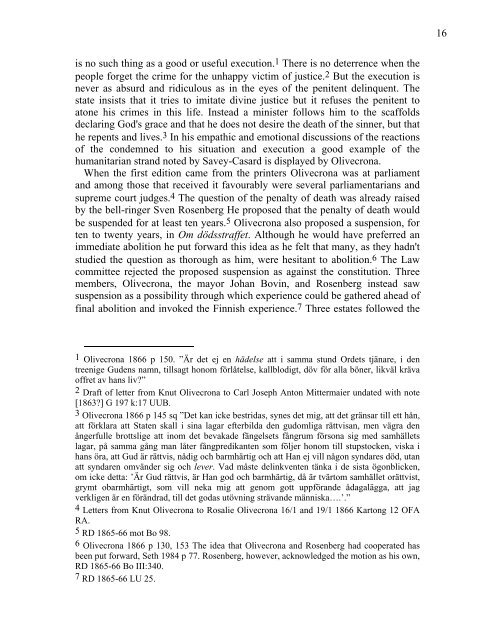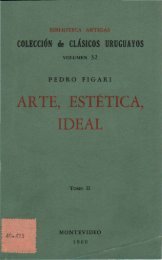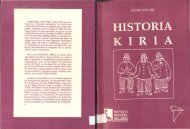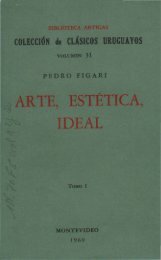Knut Olivecrona and his ”Om dödsstraffet”. - Figuras
Knut Olivecrona and his ”Om dödsstraffet”. - Figuras
Knut Olivecrona and his ”Om dödsstraffet”. - Figuras
Create successful ePaper yourself
Turn your PDF publications into a flip-book with our unique Google optimized e-Paper software.
is no such thing as a good or useful execution.1 There is no deterrence when the<br />
people forget the crime for the unhappy victim of justice.2 But the execution is<br />
never as absurd <strong>and</strong> ridiculous as in the eyes of the penitent delinquent. The<br />
state insists that it tries to imitate divine justice but it refuses the penitent to<br />
atone <strong>his</strong> crimes in t<strong>his</strong> life. Instead a minister follows him to the scaffolds<br />
declaring God's grace <strong>and</strong> that he does not desire the death of the sinner, but that<br />
he repents <strong>and</strong> lives.3 In <strong>his</strong> empathic <strong>and</strong> emotional discussions of the reactions<br />
of the condemned to <strong>his</strong> situation <strong>and</strong> execution a good example of the<br />
humanitarian str<strong>and</strong> noted by Savey-Casard is displayed by <strong>Olivecrona</strong>.<br />
When the first edition came from the printers <strong>Olivecrona</strong> was at parliament<br />
<strong>and</strong> among those that received it favourably were several parliamentarians <strong>and</strong><br />
supreme court judges.4 The question of the penalty of death was already raised<br />
by the bell-ringer Sven Rosenberg He proposed that the penalty of death would<br />
be suspended for at least ten years. 5 <strong>Olivecrona</strong> also proposed a suspension, for<br />
ten to twenty years, in Om dödsstraffet. Although he would have preferred an<br />
immediate abolition he put forward t<strong>his</strong> idea as he felt that many, as they hadn't<br />
studied the question as thorough as him, were hesitant to abolition.6 The Law<br />
committee rejected the proposed suspension as against the constitution. Three<br />
members, <strong>Olivecrona</strong>, the mayor Johan Bovin, <strong>and</strong> Rosenberg instead saw<br />
suspension as a possibility through which experience could be gathered ahead of<br />
final abolition <strong>and</strong> invoked the Finnish experience.7 Three estates followed the<br />
1 <strong>Olivecrona</strong> 1866 p 150. ”Är det ej en hädelse att i samma stund Ordets tjänare, i den<br />
treenige Gudens namn, tillsagt honom förlåtelse, kallblodigt, döv för alla böner, likväl kräva<br />
offret av hans liv?”<br />
2 Draft of letter from <strong>Knut</strong> <strong>Olivecrona</strong> to Carl Joseph Anton Mittermaier undated with note<br />
[1863?] G 197 k:17 UUB.<br />
3 <strong>Olivecrona</strong> 1866 p 145 sq ”Det kan icke bestridas, synes det mig, att det gränsar till ett hån,<br />
att förklara att Staten skall i sina lagar efterbilda den gudomliga rättvisan, men vägra den<br />
ångerfulle brottslige att inom det bevakade fängelsets fångrum försona sig med samhällets<br />
lagar, på samma gång man låter fångpredikanten som följer honom till stupstocken, viska i<br />
hans öra, att Gud är rättvis, nådig och barmhärtig och att Han ej vill någon syndares död, utan<br />
att syndaren omvänder sig och lever. Vad måste delinkventen tänka i de sista ögonblicken,<br />
om icke detta: ’Är Gud rättvis, är Han god och barmhärtig, då är tvärtom samhället orättvist,<br />
grymt obarmhärtigt, som vill neka mig att genom gott uppför<strong>and</strong>e ådagalägga, att jag<br />
verkligen är en förändrad, till det godas utövning sträv<strong>and</strong>e människa….’.”<br />
4 Letters from <strong>Knut</strong> <strong>Olivecrona</strong> to Rosalie <strong>Olivecrona</strong> 16/1 <strong>and</strong> 19/1 1866 Kartong 12 OFA<br />
RA.<br />
5 RD 1865-66 mot Bo 98.<br />
6 <strong>Olivecrona</strong> 1866 p 130, 153 The idea that <strong>Olivecrona</strong> <strong>and</strong> Rosenberg had cooperated has<br />
been put forward, Seth 1984 p 77. Rosenberg, however, acknowledged the motion as <strong>his</strong> own,<br />
RD 1865-66 Bo III:340.<br />
7 RD 1865-66 LU 25.<br />
16






